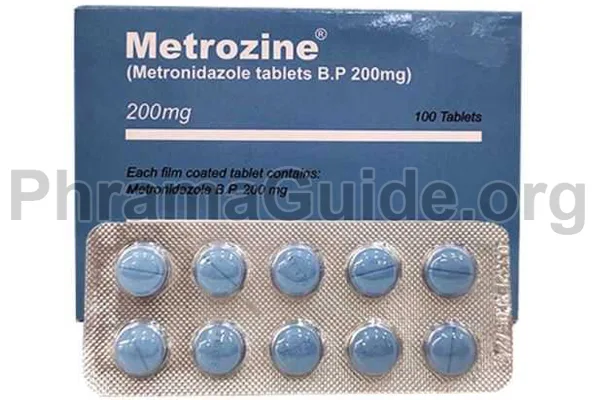Metrozine tablet is used to treat bacterial and parasitic infections that affect the skin, gastrointestinal tract, lungs, brain, and other parts of the body. It has anti-inflammatory effects that help to reduce symptoms such as swelling and pain associated with certain conditions like ulcerative colitis. Metrozine tablets are commonly used for the following indications:
- Bacterial Infections: Metrozine tablet is commonly used to treat infections in the gastrointestinal tract, such as Helicobacter pylori infection, bacterial vaginosis, and certain types of dental infections.
- Protozoal Infections: Metrozine tablet is also used to treat infections caused by parasites such as Giardia lamblia, Trichomonas vaginalis (causing trichomoniasis), Entamoeba histolytica (causing amoebiasis), and certain species of anaerobic parasites.
- Pelvic Inflammatory Disease (PID): Metrozine tablets may be used in combination with other antibiotics to treat pelvic inflammatory disease, an infection of the female reproductive organs typically caused by sexually transmitted bacteria.
- Surgical Prophylaxis: Metrozine tablets may be used prior to certain surgical procedures to prevent infections caused by anaerobic bacteria.
- Pseudomembranous Colitis: Metrozine tablet can be used to treat pseudomembranous colitis, a severe inflammation of the colon often caused by Clostridium difficile infection.
Off-label Uses of Metrozine Tablet
- Rosacea: Metrozine tablet is sometimes used off-label in the treatment of rosacea, a chronic skin condition characterized by facial redness, flushing, and small bumps. It may help reduce inflammation and improve symptoms associated with rosacea.
- Crohn’s Disease: In some cases, Metrozine tablets may be used as an adjunctive treatment for Crohn’s disease, a chronic inflammatory bowel disease. It may help reduce inflammation and control symptoms in certain individuals.
- Diverticulitis: Metrozine tablets may be used in the treatment of diverticulitis, an inflammation or infection of small pouches in the colon. It may be prescribed in combination with other antibiotics to target bacterial overgrowth and control the infection.
- Bacterial Vaginosis Prevention: Metrozine tablets may be used for the prevention of recurrent bacterial vaginosis, a common vaginal infection. It helps to maintain a healthy balance of vaginal flora.

What is Metrozine?
Metrozine is one of the leading brands of Metronidazole, manufactured and marketed by Searle Pakistan (Pvt) Ltd.
Metrozine Alternatives : Other Similar Brands
The following are some alternative brands of Metrozine and their manufacturers.
- Flagyl : Sanofi Aventis (Pakistan) Ltd.
- Klint : Sami Pharmaceuticals (Pvt) Ltd, Pakistan.
- Riam : Stanley Pharmaceuticals (Pvt) Ltd, Pakistan.
- Gramex : Platinum Pharmaceuticals (Pvt) Ltd, Pakistan
- Abozole : Abbott Laboratories (Pakistan) Ltd.
- Metni V : Shaigan Pharmaceuticals (Pvt) Ltd, Pakistan.
- Metrida : Zafa Pharmaceutical Laboratories (Pvt) Ltd, Pakistan.
- Neometin : Genom Pharmaceuticals (Pvt) Ltd, Pakistan.
- Amezole : Ferozsons Laboratories Ltd. Pakistan.
- Danizol : Don Valley Pharmaceuticals (Pvt) Ltd, Pakistan.
- Flezole : Pearl Pharmaceuticals, Pakistan.
Metrozine : Available Formulations and Strengths
Presently, Metrozine is available in Tablet, Injectable, and Syrup forms.
Metrozine Tablets : 200mg, 400mg Strengths.
Metrozine Injection : 500mg/100ml strength.
Metrozine Syrup : 200mg/5ml strength.
Who Should Not Use Metrozine?
Despite its widespread effectiveness in treating certain conditions, the use of Metrozine comes with some serious contraindications that must be carefully considered before taking it.
Metrozine should not be taken if you are allergic to it or any of its components; have liver or kidney disease; have a blood cells disorder such as anemia or leukopenia; are pregnant or breastfeeding; are taking disulfiram (Antabuse); or if you suffer from Crohn’s disease.
Additionally, Metrozine should not be used along with alcohol since this can lead to severe reactions such as nausea, vomiting, flushing, stomach pain, and headaches. Children under 10 years old should not take Metrozine unless specifically instructed by their doctor.
What is the Recommended Daily Dosage of Metrozine?
The recommended dosage varies based on individual needs but generally speaking, adults should not exceed 4000mg per day whereas children under 12 years old must not exceed 60mg/kg/day.
Adults Dose for Amebiasis Infections: 1-2 tablets 3 times daily for 5 to 10 days.
Children’s Dose for Amebiasis Infections: The dose is based on body weight, the dose is usually 35 to 50mg/kg of body weight daily, in divided 3 doses, and for 10 days.
Adults Dose for Bacterial Infections: The dose is usually 7.5mg/kg of body weight every 6 hours for 7 to 10 days. The Maximum per day dose is 4000mg and should not exceed it without consultation with a doctor
Children’s Dose for Bacterial Infections: Use Metrozine as recommended by the doctor.
Adults Dose for Trichomoniasis Infections: Metrozine can be given in 3 different ways: as a single dose of 2000mg, as 1000mg 2 times daily for 1 day, or as 250mg 3 times daily for 7 days.
Children’s Dose for Trichomoniasis Infections: Use Metrozine as recommended by the doctor.
How Metrozine Works?
Metrozine involves several steps: firstly it binds to DNA in the target cells which disrupts the strands leading to inhibition of the synthesis of nucleic acids and proteins within these cells which ultimately leads to their death.
Secondly, Metrozine inhibits the production of enzymes involved in the electron transport system resulting in cell death due to impaired energy production within the cells.
3. Lastly there is also evidence that suggests that Metrozine can interfere with motility mechanisms employed by pathogens leading them unable to move around inside host tissues thereby preventing the further spread of infection.
Related Links:

Leave A Comment